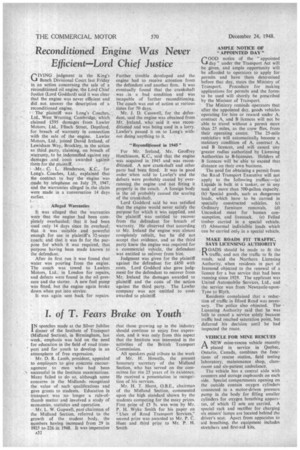Reconditioned Engine Was Never Efficient Lord Chief Justice
Page 34

If you've noticed an error in this article please click here to report it so we can fix it.
GIVING judgment in the King's Bench Divisional Court last Friday in an action concerning the sale of a reconditioned oil engine, the Lord Chief Justice (Lord Goddard) said it was clear that the engine was never efficient and did not. answer the description of a reconditioned engine.
' The plaintiff was Long's Coaches, Ltd., West Wratting, Cambridge, which claimed £595 damages from Lawler Motors. Ltd., Flinch Street, Deptford, for breach of warranty in connection with the sale of the engine. Lawler Motors, Ltd.. joined David Ireland, of Lewisham Way, Brockley, in the action as third party, claiming, on breach of warranty, to be indemnified against any damages .and costs awarded against them for the plaintiff. • • zMr. C. L. Henderson, K.C., for Longs. Coaches, Ltd., explained that the contract to buy the engine was made, by telephone on July 29, 1947, and the warranties alleged in the claim were made in a conversation 14 days earlier.
Alleged Warrantles It was alleged that the warranties were that the engine had been completely overhauled; that it had been used only 14 days since its overhaul; that it was suitable and powerful enough for use in plaintiff's 32-seater coach; and that it was fit for the purpose for which it was required, that purpose having been made known to the defendant.
After its first run it was found that water was pouring from the engine. The coach was towed to Lawlers Motors, Ltd.. in London for repairs, and defects were found in the oil pressure and the starter. A new fuel pump was fitted, but the engine again broke down when put into service.
It was again sent back for repairs.
Further trouble developed and the engine had to receive attention from the defendant and another firm. It was eventually found that the crankshaft was .in a bad condition and was incapable of further reconditioning. The coach was out of action at various times for 70 days.
Mr. J. D. Casswell, for the defendant, said the engine was obtained from Mr. Ireland, who said it was reconditioned and was being used in a lorry. Lawler's passed it on to Long's with out doing anything to it. '
"Recondisioned in 1945"
For Mr. Ireland, Mr. Geoffrey Hutchinson, K.C., said that the engine was acquired in 1945 and was reconditioned. A new crankshaft and other parts had been fitted. It was in good order when sold to Lawler's and the defects were probably caused by overrunning the engine and not fitting it properly in the coach. A foreign body in the oil probably caused the scoring of the crankshaft.
Lord Goddard said he was satisfied that the engine would never satisfy the purpose for which it was supplied, and the plaintiff was entitled to recover from the defendant for breach of warranty. He observed that according to Mr. Ireland the engine was almost completely rebuilt, but he did not accept that evidence, and as the third party knew the engine was required for a commercial vehicle, the defendant was entitled to re&wer from him.
Judgment was given for the plaintiff against the defendant for £450 with costs. Lord Goddard also gave judgment for the defendant to recover from Mr. Ireland the damages awarded to plaintiff and the costs of the action against the third party. The Lawler company was not entitled to costs awarded to plaintiff.




















































































